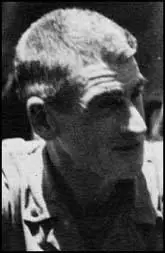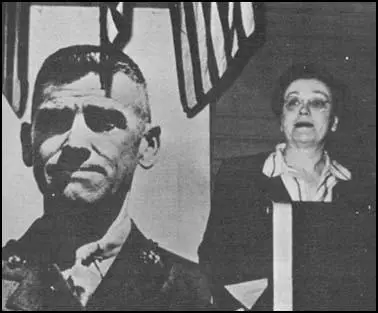Evans Carlson

Evans Carlson, the son of a church minister, was born in the United States in 1896. He ran away from home at the age of 14 and two years later lied about his age in order to join the United States Army.
Carlson was sent to the Western Front in France during the First World War but arrived too late to take part in the fighting. He left the army after the war and worked as a salesman until 1922 when he joined the United States Marine Corps.
In 1927 Carlson was sent China with the 4th Marines. After three years in China he served in Nicaragua where he had to deal with local bandit groups. This experience started a lifetime interest in guerilla warfare. After one successful operation against these bandits Carlson was awarded the Navy Cross.
After another tour of duty in China (1933-35) Carlson was appointed commander of the Marine Guard at the presidential home at Warm Springs. Carlson got to know Franklin D. Roosevelt and when he was sent to China again in 1937 he was asked to send weekly reports to the president.
Carlson witnessed the Japanese capture of Shanghai before working as an observer with the Chinese Army. Carlson noticed that while the Chinese conventional forces performed badly the small Red Army was much more successful against the Japanese invaders. For the next two years Carlson spent a considerable amount of time with the Red Army. He was impressed with the effectiveness of their guerrilla warfare tactics and the way they developed good relationships with the local people.
After finishing his period as an observer Carlson upset his superiors by giving a newspaper interview where he praised the Red Army for forming co-operatives and accusing the US government of helping Japan's war effort by supplying them with oil and other raw materials. When he was officially censored for the interview he resigned from the US Marines.
Carlson returned to the United States where he wrote two books on the subject, The Chinese Army and Twin Stars of China. He also joined the committee established by Henry L. Stimson to campaign for an embargo against Japan.
In 1940 Carlson made a private visit to China in order the investigate the progress of the cooperatives set up by the Red Army. While there he became convinced that Japan would attack the United States. He visited General Douglas MacArthur and urged him to establish guerilla units in case the Japanese Army invaded the Philippines. However, MacArthur ignored his advice.
On his return to the United States Carlson rejoined the US Marines. After Japan attacked at Pearl Harbor Carlson and Merritt Edson advocated the use of guerrilla warfare against the Japanese Army in the Pacific War. Eventually Edson was given command of the 1st Raider Battalion whereas Carlson got the 2nd Raider Battalion.
Over 7,000 applied to join the 2nd Raider Battalion but only 1,000 were accepted. Each candidate was interviewed about the political significance of the war. He later said he favoured men with initiative, adaptability and held democratic views. James Roosevelt, the son of Franklin D. Roosevelt, became Carlson's assistant.
Based in San Diego, the Carlson's Raiders were taught the military tactics employed by the Red Army against the Japanese. This included learning how to kill silently and quickly. Following the example of the guerrillas in China, Carlson abolished the traditional privileges enjoyed by officers. They ate the same food, wore the same clothes and carried the same equipment.
Carlson's observations of the Red Army convinced him that men perform better when they believe in they are fighting for a better political system. Therefore Carlson provided information on the undemocratic nature of the governments in Nazi Germany and Japan. He also encouraged the men to discuss the kind of society the men wanted after the war.
In August 1943 Carlson and 222 marines set off from Pearl Harbor and they were landed on the small island of Makin Atoll. After two days of fighting Carlson's men were able to destroy the radio station, burned equipment and captured important documents. Thirty marines were killed before General Alexander Vandegrift ordered them to leave the island. As a result of the raid the Japanese Army fortified the Gilbert Islands.
On 4th November 1943, the Carlson's Raiders landed in Guadalcana. Over the next month Carlson's men killed more than 500 Japanese while only losing 17 men. Carlson's was himself wounded and forced to return to the United States for treatment.
Carlson's superiors told him they were concerned about his unorthodox ideas and tactics. They were also concerned about his close friendship with Agnes Smedley, the radical journalist who was involved in campaigning for USA support of communist forces in China in order to help them to fight the Japanese Army in Asia.
In May 1943 Carlson was promoted to be executive officer of the Raider regiment and was stripped of direct command of his battalion in Guadalcana. Carlson now upset his superiors by becoming involved in a controversial project of publishing pamphlets on the contribution of the Afro-American in the war.
Carlson eventually returned to action in November 1943 at the battle of Tarawa. On Saipan he received severe wounds when trying to rescue a radio operator who had been shot by the Japanese. He never fully recovered from his injuries and was forced to retire from the United States Marines.
Carlson's exploits were celebrated by the book, The Big Yankee: The Life of Carlson of the Raiders (1947) and the feature film, Gung Ho.
After the war Carlson ran for the Senate in California but was forced to withdraw after suffering a heart attack. Evans Carlson died after another heart attack in May 1947.

Primary Sources
(1) Evans Carlson, letter to Agnes Smedley (November 1943)
There were two factors which modern military leaders do not seem to understand or prefer to ignore. One, comfort and personal convenience are not consonant with the conduct of military-naval operations against an alert and tenacious enemy; two, men are inspired to fight with all that is within them only by leadership based on merit, a profound knowledge of the reasons they fight, and the conviction that the things for which they fight are worth fighting for. We will win because of our economic strength, but the sacrifice in men and treasure will be out of proportion to our effort and far beyond what it would be if we as a nation had learned that there is no smooth road to freedom.
(2) Evans Carlson wrote a letter to Agnes Smedley praising her for an article in the PM Magazine (5th November 1943)
It is good to have the spotlight turned on the true state of affairs inside China. Stilwell has done a magnificent job. I know of no other man who could have accomplished what he has in the face of all the obstacles out there. And while doing it he supported the highest ideals of American democracy and decency.
(3) Evans Carlson was interviewed by Robert Sherrod of Time Magazine in November 1943.
The Marine Corps has espirit de corps it to a high degree. But when the going gets toughest, when it takes a little more drive to stay sane and to keep going, and a man is hungry and tired, then he needs more than espirit de corps. It takes conviction. Our greatest weakness is the caliber of our officers, and that, of course, is a reflection of our system of education
(4) Evans Carlson, speech at Camp Pendleton on the battle at Tarawa (December 1943)
Tarawa was won because a few enlisted men of great courage called out simply to their comrades, 'Come on, fellows. Follow me!' And then went on, followed by men who took heart at their example, to knock out, at great sacrifice, one Jap position after another, slowly, until there were no more. Tarawa is a victory because some enlisted men, unaffected by the loss of their officers, many of whom were casualties in the first hour, became great and heroic commanders in their own right.
But with all that courage and fortitude and willingness to die on the part of some of the men, too many others lacked initiative and resourcefulness. They were not trained to understand the need for sacrifice. Too many men waited for orders - and while they waited they died. What if they had been trained not to wait for orders?"
(5) Interview with a member of the Carlson's 2nd Raider Battalion that was included in Michael Blankfort's book, The Big Yankee: The Life of Carlson of the Raiders (1947)
Day after day we followed the Old Man's jungle-guerrilla tactics, putting into practice his theory of the mobile fire team. The team worked wonders. Toward evening we'd make a base; then next morning fan out patrols to find the enemy as well as the site of a forward base. The Old Man would okay it, and we'd all move up to it. The next day would be the same. The Old Man led the whole battalion over the ridge. Carlson called out, "Let's sing, Onward, Christian Soldiers." We didn't care whether or not the Japs heard us. We felt good singing.
We had spent a month in the jungle, and marched one hundred and fifty miles, met the enemy daily, captured and destroyed his guns and ammunition and food and medical supplies; we reassured the command that nothing important was going on in the interior; we mapped out his exit-west route; we destroyed 'Pistol Pete,' and finally we killed officially 488 Japs, but the Seabees who went in later to bury them said we killed 700. For all this, we lost 17 men, and 17 wounded.
(6) Herbert Merrillatt wrote about the tactics employed by Evans Carlson in his book The Marines on Guadalcanal (1944)
Most significant, though, was the demonstration of the ability of American troops, properly trained and indoctrinated, to operate independent of established supply lines in the jungle. In the thirty engagements it fought, the battalion had been surprised only twice. On the other occasions it gained complete surprise over the enemy. This fact, plus its skill in jungle fighting and its tremendous fire power, explain the low casualties we sustained in comparison to those of the enemy. The heroes of Makin Island had added another exceptional feat of arms to their history.
(7) General Samuel Griffith wrote about Evans Carlson in his book, The Battle For Guadalcanal.
He was quite a guy. There was a lot more to the man than raw courage. He was quite well-read and had a deep belief in people and their ability to overcome obstacles. Unfortunately, this was a period when it was easy to label someone like he was anything from a pinko to a card-carrying Communist. I think he was just an extremely brave and intelligent man who didn't like to bend on principle.
(8) Dick Gaines, Carlson Of the Raider Marines (1999)
Carlson had been requested to assist as technical adviser in the making of the movie Gung Ho starring the veteran actor Randolph Scott in the part of Carlson. Unlike other films, the supporting roles in this one depicted actual characters (Marines in the 2d Raider Bn). On location at San Clemente, California, hotel reservations had been made for Carlson, staff and principal actors involved in the film, while the workers were billeted in lesser quarters; Carlson insisted that they all should be bunking together since the movie was about Gung Ho, they should all try living it. Carlson got his way and they all moved to the temporary quarters. To this day the stage hands, extras and bit players used in that picture remember Carlson, not so much for Makin and Guadalcanal, but for what he did when they all went on location at San Clemente. On the back lots of Hollywood they still talk about it.
